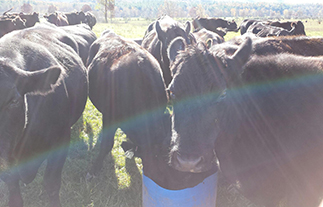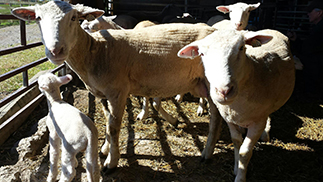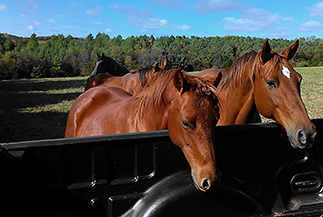Local Programs
Agriculture and natural resources (ANR) programs help sustain the profitability of agricultural and forestry production and enhance and protect the quality of our land and water resources. We help the agriculture industry use the most current technology and management practices to develop strong businesses that prosper in today's economy. We deliver programs that help put research-based knowledge to work for Virginia's agriculture industry.
ANR programs are directed toward a broad range of needs associated with the production of animals, seafood, food crops, greenhouse and nursery products, turf, and forests; the financial management of agricultural enterprises; and the protection of the environment.
Livestock production in the Shenandoah Valley continues to be a major driver of the agricultural economy of Virginia. Animal Science programs from the this office strive to reach livestock producers in Rockbridge, Augusta, and Rockingham Counties. These educational programs are designed to improve the economic viability, production efficiency, and sustainability of livestock production throughout the region.
Improving Animal Performance on Tall Fescue Presentation
Individual Videos:
- Valley Beef Conference 2019
- Effects of Calf Age at Weaning on Cow Performance – Dr. Vitor Mercadante, Virginia Tech
- Corn Silage Production – Dr. Wade Thomason, Virginia Tech
- Improving Animal Performance on Tall Fescue (ANR-135-1)
- Acknowledgement of Sponsors (ANR-135-2)
- Overview of Shenandoah Valley Fescue Study (ANR-135-3)
- Extent of Endophyte Infection (ANR-135-4)
- Effects of Extreme Toxicity (ANR-135-5)
- A year in the Life of Fescue Pasture (ANR-135-6)
- Seasonal Toxicity of the Average Pasture (ANR-135-7)
- The Paradox - Productive Fescue has a Productive Endophyte (ANR-135-8)
- Summary: What Have We Learned (ANR-135-9)
- How is the Endophyte Affected by Frost? (ANR-135-10)
- Impact of Tall Fescue Toxicosis on Beef Operations (ANR-135-11)
- Emphasize Fundamental Principles (ANR-135-12)
- History of Fescue in the Southeast (ANR-135-13)
- Problem of Fescue Toxicosis (ANR-135-14)
- Early Attempts to Control Problem (ANR-135-15)
- Research and Extension Efforts to Control and Reduce Problem (ANR-135-16)
- Development of Novel Endophyte Cultivars (ANR-135-17)
- What Alkaloid Levels Are You Willing to Accept (ANR-135-18)
- How Can I Replace my Toxic Pastures? (ANR-135-19)
- Common Concerns with Replacing Tall Fescue - Summary (ANR-135-20)




- Fence Law (PDF | 2MB)
- An Overview of Virginia Fence Law (PDF | 1MB)
- An Overview of Virginia Fence Law Handout (PDF | 143KB)
- 2013 Land Rental Guide For The Central Shenandoah Valley and Alleghany Highlands (PDF | 321KB)
- 2012 Custom Work Rate Guide for the Shenandoah Valley (PDF | 355KB)
- Sample farm lease (DOCX | 13KB)
- Land leasing cover letter points (DOC | 24KB)
- Sample Language for 5 year term on farm lease (DOC | 24KB)
This office supports crop producers in Augusta, Rockingham, and Rockbridge Counties. We offer science-based information and one-on-one consultation in all areas of crop production, with an emphasis on the production and management of forages.

Food Demonstrations
> Apple Lime Salad
> Easy Omelet
> Garden Vegetable Wrap
> Side Salad
> Swiss Chard and Cranberries
> Build Your Own Breakfast Casserole
> Build Your Own Casserole
> Build Your Own Dinner in a Cup
> Build Your Own Grain Bowl
> Build Your Own Omelet
> Build Your Own Overnight Oats
> Build Your Own Pasta Dish
> Build Your Own Salad
> Build Your Own Salsa
> Build Your Own Savory Dip
> Build Your Own Sheet Pan Meal
> Build Your Own Smoothies
> Build Your Own Snack Mix
> Build Your Own Soup
> Build Your Own Stir Fry
> Build Your Own Stuffed Baked Potatoes
> Build Your Own Sweet Dip
> Build Your Own Tex Mex Meal
> Build Your Own Wrap
For more information concerning Family Nutrition Programs, please contact Morgan Martindell and Kaye Shaner at 540-245-5750.
4-H is a community of young people across America who are learning leadership, citizenship, and life skills. 4-H, the largest comprehensive youth development program in the nation, educates young people, ages 5 to 18, through a variety of experiential techniques that encourage hands-on, active learning.
More than 20,000 adults and teens volunteer their time and energy annually to help youth experience 4-H. Our programs assist more than 170,000 Virginia youth discover and build on their own ability to make good decisions, manage resources wisely, work effectively with others, and communicate successfully. Our 4-H camping program is one of the largest in the country and provides character-building experiences to participants at our six 4-H educational centers.
Please contact Emmalee Edwards at 540-245-5750 for more information.
Engaging with Communities
Virginia Cooperative Extension specialists in community viability work with Extension agents, campus-based faculty, organizational partners, communities, and individuals to further opportunity and build capacity in five program areas:
- Leadership & Planning
- Community Enterprise and Resiliency
- Community Food System and Enterprises
- Community Planning
- Emerging Community Issues
Examples of our work include training county elected officials, educating entrepreneurs, facilitating collaborative projects, supporting the growth of community food systems and local economies, enhancing agent skills and community capacity in facilitation and leadership, conducting problem-driven research, and creating publications and tools that address critical community needs.
Do you have a question about Community Viability?
Perhaps one of the Community Viability specialists below can help you. Contact a Community Viability specialist or direct a question to them using our Ask an Expert system.


